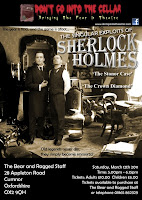 Set against two major stages, this year's Great British Folk Festival was a worthy successor to 2010. Although set on the cold Lincolnshire coast in all its bleak grandeur it could not be faulted. It's a good venue and a welcome diversion for its host, Butlins. What follows is hopefully an objective overview of what was a very busy weekend. Moving between stages it is an attempt to give a taste of the weekend and not under any circumstances provide a definitive set list for over twenty acts so apologies to those not found below.
Set against two major stages, this year's Great British Folk Festival was a worthy successor to 2010. Although set on the cold Lincolnshire coast in all its bleak grandeur it could not be faulted. It's a good venue and a welcome diversion for its host, Butlins. What follows is hopefully an objective overview of what was a very busy weekend. Moving between stages it is an attempt to give a taste of the weekend and not under any circumstances provide a definitive set list for over twenty acts so apologies to those not found below.Opening Friday, Three Daft Monkeys displayed an energetic and theatrical performance even though it was somewhat marred by inconsistent acoustics. At times intros and banter was barely audible. Their exhortation to 'roll up' defined their whole approach to their music. 'One Fine Day' and 'Paranoid Big Brother' from the benchmark "Social Vertigo" album were particularly memorable.
 In complete contrast and with a smaller billing, Emily Smith recently nominated for a 2012 Folk Award displayed a mastery of keyboards, accordion and guitar. Songs were often Scottish traditional - 'Whistle O'er the Lave O It' and 'The Plooman' but still managing to digress to Richard Thomson's classic 'Waltzing for Dreams'. Chumbawamba may possibly have offended the more traditionalists with their rousing political set that included El Fusilado, and possibly one of the very few songs celebrating Charles Darwin, 'Charlie'.
In complete contrast and with a smaller billing, Emily Smith recently nominated for a 2012 Folk Award displayed a mastery of keyboards, accordion and guitar. Songs were often Scottish traditional - 'Whistle O'er the Lave O It' and 'The Plooman' but still managing to digress to Richard Thomson's classic 'Waltzing for Dreams'. Chumbawamba may possibly have offended the more traditionalists with their rousing political set that included El Fusilado, and possibly one of the very few songs celebrating Charles Darwin, 'Charlie'.
Whilst they were tearing up Centre Stage, Ralph McTell followed Emily Smith on the rival 'REDS'. As you would expect from the man it gave a loyal audience exactly what they wanted. Although currently touting recent album "Somewhere Down The Road" he still had the grace to perform 'Streets of London' and in respect to the late Bert Jansch, 'Angie'. On the other hand, is that 'Anji'? Saturday evening saw an acoustic Steve Gibbons, Matthews Southern Comfort and Cara Dillon.
As far as festival content goes, it definitely leans towards the folk rock idiom of the late sixties aptly exemplified by Fairport Connections ((Dave Pegg, Gerry Conway, Anna Ryder, Anthony John Clarke, Bob Fox, P.J.Wright and Steve Tilston) who took the stage on Sunday afternoon followed in the evening by Jacqui McShee's Pentangle and The Dylan Project.
The organisers this year threw in a couple of 'curveballs' with the inclusion of The Wurzels (surely an aging novelty act?) and Kanda Bongo Man. 'Bongo Man' championed by Andy Kershaw and the late John Peel is more a 'WOMAD' act with his infectious African sound.
However, this is a festival that appears to be embracing diversity, yet suspiciously defined by Cropedy Festival but this is only the second year so it may take on a more 'Cambridge' hue. This year definitely captured last year's spirit and plans are in place for a return in 2012, tickets are on sale but no artists announced but don't let that put you off either. Based on their track record in organising two superb weekends I'm sure 2012 will be another pre-Christmas cracker.
Edited version of review posted on the Remotegoat website.




